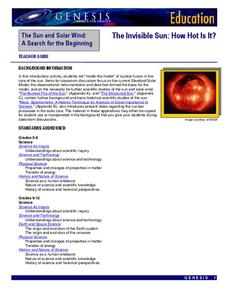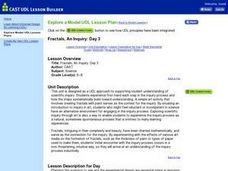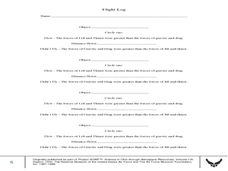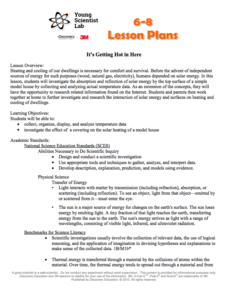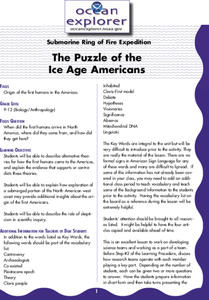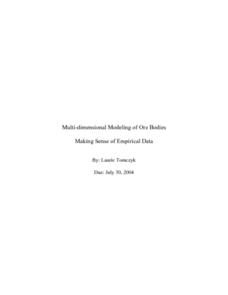American Chemical Society
Using the Properties of Materials to Improve a Model Boat
Work together to stay afloat. Using a paper boat, pupils connect properties of materials to their usefulness. They test different paper to determine how many pennies each boat will hold and learn that combining materials with different...
Curated OER
The Blue Bottle: An Example of Teacher-Guided Inquiry
Learners observe a demonstration in which a bottle containing a colorless solution is mixed, turns blue, then becomes colorless again. They record observations, form and discuss hypotheses, and draw a conclusion based on the evidence.
Curated OER
Muscular and Skeletal Systems
How do muscles move bones? Find out using a built-in-class model. Pupils construct a hand model with paper and string, then follow a series of directions to explore the movement process. Discover additional information about the muscular...
Tracy Pendry
Cardiovascular/Circulatory System
Explore the circulatory system with a cardiovascular pump activity that promotes discovery and discussion as class members create a functioning model of the heart. Continue the learning process through a web quest showcasing the body's...
Curated OER
Scientific Investigation- Magnets
Students conduct a scientific investigation to determine if a magnet attracts paper clips through different materials. Students write out their procedures, collect data and present it in a table or chart, and analyze their results.
Curated OER
Sources of Potential Groundwater Contamination
Students construct models that demonstrate potential sources of contamination. Students select one type of contamination model (septic system, sinkhole, landfill, disposal lagoon, leaky barrels, oil spill, agricultural contamination) to...
Curated OER
F = ma, Inertia, and Action-Reaction
Fourth graders apply concepts of Newton's Laws in scientific inquiries. Use this instructional activity to have your charges test and identify the characteristics of objects that make them easier or harder to push. After a teacher-led...
Curated OER
Variables and Controls in an Investigation
Seventh graders identify variables and controls in a paper airplane investigation. In this scientific method lesson, 7th graders conduct an experiment to determine the variables that affect the flight of paper airplanes. They design an...
Curated OER
Death On Board La Belle: Finding Clues from Old Bones
Students practice analyzing skeletal remains for clues by using the Internet. In this scientific investigation lesson, students research the La Belle shipwreck using the Internet and written materials, later completing a Skeletal Report...
Curated OER
Which Brand of Air Freshener is Most Cost Effective?
Students use scientific method to determine cost-effectiveness of air freshener, and create PowerPoint presentations to share their results.
Curated OER
Creating a 3d Model and Corresponding Topographic Map
Young scholars create a landform model and topographic map. In this topography lesson, learners use a real landform to create a model and topographic map to scale.
NASA
The Invisible Sun: How Hot Is It?
It's getting hot in here! The first in a series of six lessons has learners model nuclear fusion with a simple lab investigation. Groups collect data and analyze results, comparing their models to the actual process along the way.
Curated OER
Farming Fantastic Friends
Seventh graders demonstrate scientific inquiry to design and perform an experiment involving Grow Creatures. They participate in a class discussion, and in small groups design an experiment that determines how to change the materials to...
Curated OER
Fractals, An Inquiry: Day 3
Students develop questions for their inquiries and plan their experiments. They are supported by a modeled case study of Max the Dog's Inquiry Planning Process, as well as supported by a planning template, The Inquiry Organizer.
Curated OER
Aquifer Model
Students, after researching and brainstorming about aquifers and locating aquifer maps of Texas, participate in the building of a model of an aquifer complete with a pumping station. They also answer a variety of questions at the...
Curated OER
Household Things that Fly and Why!!!
Students examine the four forces of flight. In this flight lesson, students test to see which types of items will fly. Students make predictions on whether the item will fly or not. Students gain knowledge about lift, gravity, thrust and...
PHET
Iron Filings and Magnetic Field Lines
How do magnetic fields differ? Allow scholars to see the difference between 2-D and 3-D magnetic fields. They construct models of both and observe how they are similar and different. It is the fifth installment of an 18-part unit.
Science 4 Inquiry
The Classification of Living Things
It's a classification sensation! Demystify why we classify using an inquiry activity that helps your class sort things out. Groups begin by classifying a variety of shoes before they research organisms and design their own dichotomous...
Discovery Education
It's Getting Hot in Here
Class members engage in a STEM experiment and investigate how materials affect heating in a house by creating models of houses and using different top surface materials. They record the temperature inside the models and consider what the...
National Nanotechnology Infrastructure Network
Creating and Testing Silver-Nanoparticle Socks
Antibacterial socks are a product of nanotechnology. An inquiry-based lesson asks collaborative groups to create their own antibacterial socks and then test them against other products on the market. The sock with the least amount of...
Curated OER
Modeling Mitosis and Meiosis
Students construct and manipulate models of mitosis and meiosis and compare/contrast them. They create the models using index cards and yarn, interpret diagrams and photographs, and summarize written descriptions.
Curated OER
Cell Division: Frog Egg Division Observation and Modeling
Students create and test a hypothesis about cell division. After observation of Frog Egg cell division, students write obervations and refine process and hypothesis. The use of scientific method, group work and inquiry are fostered by...
Curated OER
The Puzzle of the Ice Age Americans
Students describe alternative theories for how the first humans came to the Americas, and explain evidence that supports or contradicts these theories. They examine the role of skepticism in scientific inquiries.
Curated OER
Multi-dimensional Modeling of Ore Bodies Making Sense of Empirical Data
Math scholars identify four different rock types in that strata and use this identification and data to construct a two dimensional geologic cross-section. They use data tables to construct a three-dimensional geologic cross-section.













